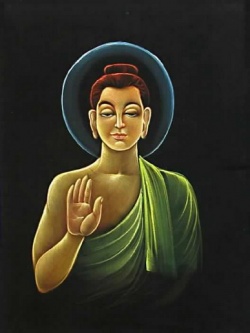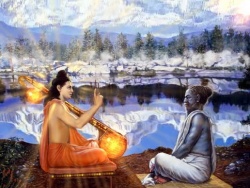Difference between revisions of "Ambattha"
m (Adminos moved page Ambattha-mānava to Ambattha) |
|||
| (5 intermediate revisions by 3 users not shown) | |||
| Line 1: | Line 1: | ||
[[File:5740449 n.jpg|thumb|250px|]] | [[File:5740449 n.jpg|thumb|250px|]] | ||
| − | |||
| − | Asked by the [[Buddha]] to what family he belonged, [[Ambattha]] replied that he came of the [[Kanhāyana-gotta]]; thereupon the [[Buddha]] traced the family back to its ancestor, who had been the offspring of a slave girl of [[Okkāka]], named [[Disā]]. The child had been able to talk as soon as he was born and, because of this devilish trait, had been called [[Kanha]] ([[devil]]), hence the family name. [[Kanha]] later became a mighty seer and married [[Maddarūpī]], daughter of [[Okkāka]] (D.i.96-7). | + | |
| + | |||
| + | |||
| + | |||
| + | |||
| + | |||
| + | |||
| + | |||
| + | |||
| + | |||
| + | 1. '''Ambattha'''.-(usually called '''[[Ambattha-mānava]]'''). A [[brahmin]] youth of the [[Ambattha]] {{Wiki|clan}} who lived with his [[teacher]], [[Pokkharasādi]], at [[Ukkatthā]]. He was learned in the three [[Vedas]] and the correlated branches of [[knowledge]], [[including]] the [[Lokāyata]], as recorded in the [[Ambattha Sutta]] (D.3). Once, at the request of his [[teacher]], he visited the [[Buddha]] in the [[Icchānadkala]] [[wood]] and seems to have opened his [[conversation]] by reviling the [[Sākiyans]] and calling them menials. It appears that [[Ambattha]] had once gone on some business of [[Pokkharasādi]]'s to [[Kapilavatthu]], to the Mote Hall of the [[Sākyans]], and had been insulted there (D.i.91). | ||
| + | |||
| + | Asked by the [[Buddha]] to what [[family]] he belonged, [[Ambattha]] replied that he came of the [[Kanhāyana-gotta]]; thereupon the [[Buddha]] traced the [[family]] back to its [[ancestor]], who had been the offspring of a slave girl of [[Okkāka]], named [[Disā]]. The child had been able to talk as soon as he was born and, because of this devilish trait, had been called [[Kanha]] ([[devil]]), hence the [[family]] [[name]]. [[Kanha]] later became a mighty [[seer]] and [[married]] [[Maddarūpī]], daughter of [[Okkāka]] (D.i.96-7). | ||
[[Ambattha]] makes no remonstrance against this genealogy and, under pressure, accepts it as true. This gives the [[Buddha]] an opportunity of preaching on the futility of [[feeling]] vanity regarding one's [[caste]] and on the worth of [[morality]] and conduct. | [[Ambattha]] makes no remonstrance against this genealogy and, under pressure, accepts it as true. This gives the [[Buddha]] an opportunity of preaching on the futility of [[feeling]] vanity regarding one's [[caste]] and on the worth of [[morality]] and conduct. | ||
[[File:A-Muni.jpg|thumb|250px|]] | [[File:A-Muni.jpg|thumb|250px|]] | ||
| − | At the end of the {{Wiki|discourse}} the [[Buddha]] walked up and down outside his chamber so that [[Ambattha]] might see on his [[body]] the thirty-two signs of a great man. [[Ambattha]] goes back to [[Pokkharasadi]] and reports the whole interview. [[Pokkharasādi]] is greatly incensed, abuses [[Ambattha]] and kicks him. Later [[Pokkharasādi]] goes himself to the [[Buddha]] and invites him for a meal. At the end of the meal the [[Buddha]] instructs him in his [[Doctrine]] and is accepted as the [[Teacher]] both of [[Pokkharasādi]] himself and of his followers and dependants at [[Ukkatthā]]. [[Pokkharasādi]] himself becomes a [[Sotāpanna]] (DA.i.278). | + | At the end of the {{Wiki|discourse}} the [[Buddha]] walked up and down outside his chamber so that [[Ambattha]] might see on his [[body]] the [[thirty-two signs of a great man]]. [[Ambattha]] goes back to [[Pokkharasadi]] and reports the whole interview. [[Pokkharasādi]] is greatly incensed, abuses [[Ambattha]] and kicks him. Later [[Pokkharasādi]] goes himself to the [[Buddha]] and invites him for a meal. At the end of the meal the [[Buddha]] instructs him in his [[Doctrine]] and is accepted as the [[Teacher]] both of [[Pokkharasādi]] himself and of his followers and dependants at [[Ukkatthā]]. [[Pokkharasādi]] himself becomes a [[Sotāpanna]] (DA.i.278). |
| − | We are not told that [[Ambattha]] became a follower of the [[Buddha]]. [[Buddhaghosa]] says (DA.i.274) that the [[Buddha]] knew that [[Ambattha]] would not profit by his {{Wiki|discourse}} in his present [[life]] (iminā attabhāvena magga-pātubhāvo natthi), and that therefore a sermon with the idea of converting him would only have meant spending unnecessary time. [[Ambattha]] himself only visited the [[Buddha]] on account of his interest in {{Wiki|physiognomy}}. According to [[Buddhaghosa]] the idea of the [[Buddha]] in preaching the [[Ambattha Sutta]] at such length was that it might be repeated to [[Pokkharasādi]]. | + | We are not told that [[Ambattha]] became a follower of the [[Buddha]]. [[Buddhaghosa]] says (DA.i.274) that the [[Buddha]] knew that [[Ambattha]] would not profit by his {{Wiki|discourse}} in his {{Wiki|present}} [[life]] (iminā attabhāvena magga-pātubhāvo [[natthi]]), and that therefore a {{Wiki|sermon}} with the [[idea]] of converting him would only have meant spending unnecessary [[time]]. [[Ambattha]] himself only visited the [[Buddha]] on account of his [[interest]] in {{Wiki|physiognomy}}. According to [[Buddhaghosa]] the [[idea]] of the [[Buddha]] in preaching the [[Ambattha Sutta]] at such length was that it might be repeated to [[Pokkharasādi]]. |
| − | It is conjectured that the [[Ambattha]], who is identified with [[Kāvinda]], one of the counsellors of King Vedeha, in the [[Ummagga Jātaka]] (J.vi.478), probably refers to the [[Ambattha]] of this [[sutta]]. | + | It is conjectured that the [[Ambattha]], who is identified with [[Kāvinda]], one of the counsellors of [[King]] [[Vedeha]], in the [[Ummagga Jātaka]] (J.vi.478), probably refers to the [[Ambattha]] of this [[sutta]]. |
----------------------- | ----------------------- | ||
<br/> | <br/> | ||
| − | 2. [[Ambattha]].-A king of old, at whose court [[Rāhulamātā]] in one of her former lives had been a handmaid. In that [[life]] she had given [[alms]] to a holy man and, as a result, became in her next birth consort of the King of [[Benares]]. J.iii.413-14. | + | 2. [[Ambattha]].-A [[king]] of old, at whose court [[Rāhulamātā]] in one of her former [[lives]] had been a handmaid. In that [[life]] she had given [[alms]] to a [[holy man]] and, as a result, became in her next [[birth]] [[consort]] of the [[King]] of [[Benares]]. J.iii.413-14. |
{{R}} | {{R}} | ||
[http://www.palikanon.com/english/pali_names/am/ambattha.htm palikanon.com] | [http://www.palikanon.com/english/pali_names/am/ambattha.htm palikanon.com] | ||
| − | [[Category:Ambattha | + | [[Category:Ambattha]] |
Latest revision as of 12:50, 2 April 2024
1. Ambattha.-(usually called Ambattha-mānava). A brahmin youth of the Ambattha clan who lived with his teacher, Pokkharasādi, at Ukkatthā. He was learned in the three Vedas and the correlated branches of knowledge, including the Lokāyata, as recorded in the Ambattha Sutta (D.3). Once, at the request of his teacher, he visited the Buddha in the Icchānadkala wood and seems to have opened his conversation by reviling the Sākiyans and calling them menials. It appears that Ambattha had once gone on some business of Pokkharasādi's to Kapilavatthu, to the Mote Hall of the Sākyans, and had been insulted there (D.i.91).
Asked by the Buddha to what family he belonged, Ambattha replied that he came of the Kanhāyana-gotta; thereupon the Buddha traced the family back to its ancestor, who had been the offspring of a slave girl of Okkāka, named Disā. The child had been able to talk as soon as he was born and, because of this devilish trait, had been called Kanha (devil), hence the family name. Kanha later became a mighty seer and married Maddarūpī, daughter of Okkāka (D.i.96-7).
Ambattha makes no remonstrance against this genealogy and, under pressure, accepts it as true. This gives the Buddha an opportunity of preaching on the futility of feeling vanity regarding one's caste and on the worth of morality and conduct.
At the end of the discourse the Buddha walked up and down outside his chamber so that Ambattha might see on his body the thirty-two signs of a great man. Ambattha goes back to Pokkharasadi and reports the whole interview. Pokkharasādi is greatly incensed, abuses Ambattha and kicks him. Later Pokkharasādi goes himself to the Buddha and invites him for a meal. At the end of the meal the Buddha instructs him in his Doctrine and is accepted as the Teacher both of Pokkharasādi himself and of his followers and dependants at Ukkatthā. Pokkharasādi himself becomes a Sotāpanna (DA.i.278).
We are not told that Ambattha became a follower of the Buddha. Buddhaghosa says (DA.i.274) that the Buddha knew that Ambattha would not profit by his discourse in his present life (iminā attabhāvena magga-pātubhāvo natthi), and that therefore a sermon with the idea of converting him would only have meant spending unnecessary time. Ambattha himself only visited the Buddha on account of his interest in physiognomy. According to Buddhaghosa the idea of the Buddha in preaching the Ambattha Sutta at such length was that it might be repeated to Pokkharasādi.
It is conjectured that the Ambattha, who is identified with Kāvinda, one of the counsellors of King Vedeha, in the Ummagga Jātaka (J.vi.478), probably refers to the Ambattha of this sutta.
2. Ambattha.-A king of old, at whose court Rāhulamātā in one of her former lives had been a handmaid. In that life she had given alms to a holy man and, as a result, became in her next birth consort of the King of Benares. J.iii.413-14.

